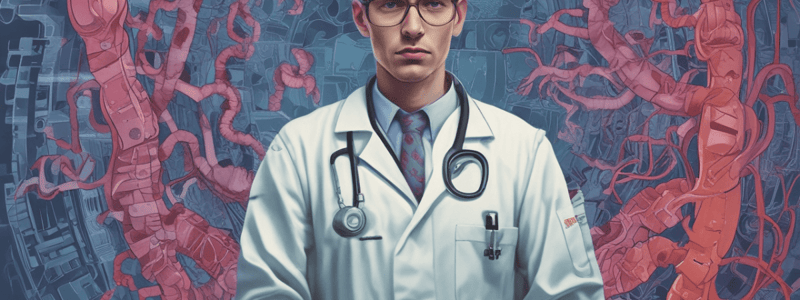Podcast
Questions and Answers
What is the primary distinction between disease and infection?
What is the primary distinction between disease and infection?
- Infection is the adverse effect on the host, while disease is the invasion and multiplication of a pathogen.
- Infection is a broader term that includes disease, but disease is a more specific term.
- Disease is caused by a physical injury, while infection is not.
- Disease is the adverse effect on the host, while infection is the invasion and multiplication of a pathogen. (correct)
What is the term for the study of the cause of a disease?
What is the term for the study of the cause of a disease?
- Pathology
- Microbiology
- Epidemiology
- Etiology (correct)
Who developed the pasteurization process and the rabies and anthrax vaccine?
Who developed the pasteurization process and the rabies and anthrax vaccine?
- Robert Koch
- Agostino Bassi
- Louis Pasteur (correct)
- Antonie van Leeuwenhoek
What is the term for a disease that can be spread via direct or indirect contact from one animal to another?
What is the term for a disease that can be spread via direct or indirect contact from one animal to another?
What is the primary purpose of 'Koch's Postulates'?
What is the primary purpose of 'Koch's Postulates'?
What is a characteristic of commensal pathogens?
What is a characteristic of commensal pathogens?
Which of the following best describes zoonotic pathogens?
Which of the following best describes zoonotic pathogens?
What is necessary for pathogens to establish a unique habitat within the host?
What is necessary for pathogens to establish a unique habitat within the host?
What is the relationship between exposure and infection?
What is the relationship between exposure and infection?
What is the most common outcome of viral infections?
What is the most common outcome of viral infections?
What is true about the multiplication of pathogens within the host?
What is true about the multiplication of pathogens within the host?
What is a fundamental limitation of Koch's Postulates?
What is a fundamental limitation of Koch's Postulates?
Which of the following types of microbes is capable of causing disease?
Which of the following types of microbes is capable of causing disease?
What percentage of microbes are capable of causing disease?
What percentage of microbes are capable of causing disease?
What is the primary characteristic that defines a pathogen?
What is the primary characteristic that defines a pathogen?
What is the smallest type of microbe?
What is the smallest type of microbe?
What type of pathogen always causes disease in order to transmit and survive evolutionarily?
What type of pathogen always causes disease in order to transmit and survive evolutionarily?
Which type of pathogen is typically found in the indigenous microbiota of a host?
Which type of pathogen is typically found in the indigenous microbiota of a host?
What type of pathogen causes disease only when the host has an impairment in immunity?
What type of pathogen causes disease only when the host has an impairment in immunity?
Which type of pathogen can replicate within the environment and is capable of infecting and multiplying within a host?
Which type of pathogen can replicate within the environment and is capable of infecting and multiplying within a host?
What type of pathogen is transmitted from the environment into the host, where it can cause disease?
What type of pathogen is transmitted from the environment into the host, where it can cause disease?
What occurs when there is overgrowth of a commensal pathogen?
What occurs when there is overgrowth of a commensal pathogen?
What are the possible outcomes if a host is infected with a pathogen, regardless if they have clinical and or non-clinical signs?
What are the possible outcomes if a host is infected with a pathogen, regardless if they have clinical and or non-clinical signs?
During which stage of infectious disease are general, non-specific signs present?
During which stage of infectious disease are general, non-specific signs present?
During which stage of infectious disease are signs and symptoms more severe and specific?
During which stage of infectious disease are signs and symptoms more severe and specific?
Which of the following is only possible within a host that is experiencing clinical signs (and is therefore not possible in a host without clinical signs)?
Which of the following is only possible within a host that is experiencing clinical signs (and is therefore not possible in a host without clinical signs)?
During which stage of infectious disease does the host return to normalcy?
During which stage of infectious disease does the host return to normalcy?




